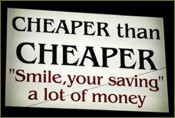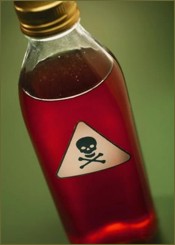Cuts and Casualties
 Yesterday, I became aware of a horrific case in Peterborough. The local primary care trust, in its infinite wisdom, had left a man (named Terence Burch) who is paralysed from the neck down due to a spinal infection, without the care to which the trust had said he was entitled. His wife Angela, exasperated by the inaction of the authorities, decided to go on hunger strike, stating that she was prepared to die in order to force the trust’s hand. In her opinion, this had come about due to cost-cutting measures; it is entirely possible that some faceless bean-counter had somehow decided that Mrs. Burch could act as a carer and thus save the organisation some money for an extended period.
Yesterday, I became aware of a horrific case in Peterborough. The local primary care trust, in its infinite wisdom, had left a man (named Terence Burch) who is paralysed from the neck down due to a spinal infection, without the care to which the trust had said he was entitled. His wife Angela, exasperated by the inaction of the authorities, decided to go on hunger strike, stating that she was prepared to die in order to force the trust’s hand. In her opinion, this had come about due to cost-cutting measures; it is entirely possible that some faceless bean-counter had somehow decided that Mrs. Burch could act as a carer and thus save the organisation some money for an extended period.
Personally, I wince at this particular episode, as my father was struck down with a similar infection last October. When he went to a NHS hospital, the doctors showed the same cavalier attitude towards his condition that Mr. Burch received from those entrusted with his care. My father was fortunate enough to have the wherewithal to get the assistance of a private doctor and clinic, which means that he has been pain-free for a number of months and is now fully mobile; had he not had this treatment, it is entirely possible his fate would have been similar to the unfortunate gentleman in Peterborough.
However, I suggest that Burches’ case will have a satisfactory ending; to be sure, Peterborough would rather not have its reputation tarnished by the spectacle of a grieving wife starving herself. However, the incident is suggestive of a pattern which is emerging: far from “cuts that care”, what is happening is entirely haphazard and it is already having disastrous consequences.
In addition to my normal work at my university, I am a trade union activist; as a result, I am constantly up to my eyes in information about what “savings” are being proposed by management. It has already been announced that 200 jobs are to go; the local unions showed their displeasure by cutting out 200 silhouettes and placing them on the common late last month. Union members were also invited to have their lunch alongside the shadows. The message was clear: the “200 cuts” are people with homes, families and obligations. These people have been performing essential services hitherto; not even management has been so crass as to say otherwise. They have been caught up in what is essentially a deck-chair shifting exercise which is intended to cut budgets while increasing workloads for those who remain. The rhetoric may speak of efficiency and providing “more for less”, the reality is trying to squeeze less people for more. What is even more worrisome is that like most re-organisations I have experienced in private industry, it seems unlikely that it will achieve its stated objectives. Furthermore, quality of provision is destined suffer as a result.
What makes the overall situation even more intolerable is that in the case of both health and higher education, the average citizen pays a great deal for those services already. If one considers how taxation follows an individual from the corner shop to the petrol pump to the high street bank, it becomes apparent that government is constantly reaching its grubby hands into our pockets to grab any loose coppers that may be available, or rather, any money it can conceivably take. This would be considered a social compact if everyone paid their fair share and the public services provided in exchange were consistent, reliable and well managed. This last sentence, however, is more readily considered a joke than a reality.
Worse, it is clear that the government intends to take still more and provide still less: VAT will rise to 20% shortly, which will affect every citizen. Every reputable analysis suggests that while the rich will pay more in raw cash amounts due to this increase, in terms of percentage of income, this rise will mostly hurt those on modest or low incomes. At the same time, school building programmes are being cut, the NHS is under pressure to reallocate its resources “more efficiently”, cuts to welfare, disability benefit, and child benefit are all in train. The Browne review on university funding is likely to take the cap off of university fees, albeit in stages. Meanwhile, the elites in both government and finance which created this unbearable situation rest beneath the tide and they are neither rolled nor roiled by it. One need only go to Mayfair and see the pristine glory of boutiques like Asprey, or go to lunch at Harvey Nichols in Knightsbridge and look around at the perfumed and the coiffed. Their lives have been apparently untouched; perhaps they took a bit of a dunking in the recent stock market turmoil, but nothing too serious. Job losses and hunger strikes to get basic services are as far from their lives as the moon is from Earth: visible, sometimes glaring, but overall irrelevant. And while it may be dangerous to generalise, the impression I get is that they don’t care. Raw figures do provide some confirmation of this perception: according to Philanthropy UK, charitable giving fell by 11% in 2009, in particular there was a “noticeable fall in average donations by higher income earners and those in professional occupations”.
Lower down the economic scale, a similar pattern also prevails. In 2008, a pay claim made by the employees of my university was rejected by the management, because it threatened the “hard won financial stability” of the organisation. The university had been through several rounds of expenditure and personnel cuts at that point. Yet, as stated, still more are required: apparently financial stability was more an illusion than a reality, and the leadership did not make adequate provision for the vagaries of the future. Yet none of the cuts will fall upon them; to my knowledge, none has taken a salary cut, nor done anything which suggests that they intend to don the hairshirt of austerity which the rest of us now will have as our main garment. Nor have we heard any apologies which clearly stated “We got it wrong.” Any resignations or early retirements have not been for reasons associated with this lapse in strategic planning. Management’s rhetoric suggests that they are paying attention to the staff’s present feelings of pain and uncertainty; however, this is again the kind of caring that may be akin to expressing birthday wishes for a distant and unloved relative. One knows that the forms must be obeyed, but the heart isn’t really in it.
It should be noted that all this is happening prior to the Comprehensive Spending Review, whose full impact will be felt in the autumn. The excessive verbiage that follows will no doubt concentrate on how “front line services” are being protected; the reality is likely to mean many more Terence Burches. There will likely be so many, in fact, that the media’s narrow attention span cannot possibly take in the sheer breadth of the travesty. The bean counters, like those in Peterborough Primary Care Trust, are in the ascendant. As per Oscar Wilde’s definition of a cynic, these are the kind of people who know the price of everything and the value of nothing; no doubt, they believe they are working towards the nation’s books being balanced yet at the same time happily protecting their bosses and themselves. The real costs and the real casualities, however, are unlikely to receive an entry or even a notation in their ledgers.

 It is difficult to predict, but my blog posting may become more sporadic for a time. This is not due to a lack of things to write about; no doubt the worrisome news that is presently streaming out of Whitehall and Westminster will continue to flow unabated. However, I have a lot to do over the coming weeks, especially once graduation is behind me; in particular, I am getting to grips with sorting out my residence and putting it up for sale. On Saturday, I rented a carpet cleaner and used it on the front hall. In order to get the best out of it, I had to clear the area of all the accumulated detritus of 3 and 1/2 years: umbrella stands and plastic shoe boxes, gardening equipment and a stepladder, and a small wooden table upon which the unread post, mostly junk mail, had accumulated. After the carpet was clean and dry, I walked upon it with bare feet. The sun was shining through an open window, a fresh breeze swept in. The dust and cobwebs were gone, replaced by the sharp scent of detergent: this is what it will look like, I thought, once I move out. There is a time to say a final farewell to yesterday, and this day is approaching.
It is difficult to predict, but my blog posting may become more sporadic for a time. This is not due to a lack of things to write about; no doubt the worrisome news that is presently streaming out of Whitehall and Westminster will continue to flow unabated. However, I have a lot to do over the coming weeks, especially once graduation is behind me; in particular, I am getting to grips with sorting out my residence and putting it up for sale. On Saturday, I rented a carpet cleaner and used it on the front hall. In order to get the best out of it, I had to clear the area of all the accumulated detritus of 3 and 1/2 years: umbrella stands and plastic shoe boxes, gardening equipment and a stepladder, and a small wooden table upon which the unread post, mostly junk mail, had accumulated. After the carpet was clean and dry, I walked upon it with bare feet. The sun was shining through an open window, a fresh breeze swept in. The dust and cobwebs were gone, replaced by the sharp scent of detergent: this is what it will look like, I thought, once I move out. There is a time to say a final farewell to yesterday, and this day is approaching. My grandfather liked to tell the following anecdote: one day, a man is walking down a street, when he spots his friend approaching him. Upon closer inspection, the man notices that his buddy has a rubber band around his head. Upon greeting him, the man asks, “Why do you have a rubber band around your head? Doesn’t that hurt?” The friend replies, “Of course it does, but it will feel real good once I take it off.”
My grandfather liked to tell the following anecdote: one day, a man is walking down a street, when he spots his friend approaching him. Upon closer inspection, the man notices that his buddy has a rubber band around his head. Upon greeting him, the man asks, “Why do you have a rubber band around your head? Doesn’t that hurt?” The friend replies, “Of course it does, but it will feel real good once I take it off.” Last night, I spoke to my father on the telephone. There were a number of matters we discussed, some heavy, some lighthearted, however one thing he said particularly stuck in my mind. He stated that a chapter in my life was ending, another was soon to begin. He finished off the conversation by reminding me that both he and my mother would see me soon.
Last night, I spoke to my father on the telephone. There were a number of matters we discussed, some heavy, some lighthearted, however one thing he said particularly stuck in my mind. He stated that a chapter in my life was ending, another was soon to begin. He finished off the conversation by reminding me that both he and my mother would see me soon. I suppose the most remarkable thing about the Emergency Budget is how calmly most people are taking it. If one lays out its main propositions in language less flowery than the Chancellor used, it is certainly inflammatory. The average citizen will be hit up for more tax, get less public services, pay more for their childrens’ university fees and unemployment will rise; however corporation tax will be reduced and the banks, which were the cause of much of our present troubles, will pay a small proportion of their income in new taxes. There will be a relatively small rise in capital gains tax and certainly no
I suppose the most remarkable thing about the Emergency Budget is how calmly most people are taking it. If one lays out its main propositions in language less flowery than the Chancellor used, it is certainly inflammatory. The average citizen will be hit up for more tax, get less public services, pay more for their childrens’ university fees and unemployment will rise; however corporation tax will be reduced and the banks, which were the cause of much of our present troubles, will pay a small proportion of their income in new taxes. There will be a relatively small rise in capital gains tax and certainly no  It’s been rather difficult to focus on politics lately. Panem et circenses abounds particularly at World Cup time: who really wants to think too deeply about current affairs when England’s lineup is suspect and those bloody vuvuzelas haven’t been banned from matches as they damn well ought to be?
It’s been rather difficult to focus on politics lately. Panem et circenses abounds particularly at World Cup time: who really wants to think too deeply about current affairs when England’s lineup is suspect and those bloody vuvuzelas haven’t been banned from matches as they damn well ought to be? I’m rather relieved that Father’s Day will soon be upon us. After it’s over, I won’t have to purchase any gifts for the next 3 months; given the present strains on my bank account, this is helpful. However, between here and there, I am going to have to find something suitable, write a thoughtful note, and have it shipped. This is a ritual which I’ve been going through repeatedly since Christmas. Once one occasion has been addressed, another follows in its wake: birthdays follow Christmas which are then followed by “greeting card” holidays for Mothers, Fathers and even St. Patrick. I recall standing in a New York mall shortly after New Years Day: while the Christmas lights were still aglow and bright red ornaments adorned plastic pine trees, the displays of various shops were already implying that it was not too soon to make purchases for Valentine’s Day.
I’m rather relieved that Father’s Day will soon be upon us. After it’s over, I won’t have to purchase any gifts for the next 3 months; given the present strains on my bank account, this is helpful. However, between here and there, I am going to have to find something suitable, write a thoughtful note, and have it shipped. This is a ritual which I’ve been going through repeatedly since Christmas. Once one occasion has been addressed, another follows in its wake: birthdays follow Christmas which are then followed by “greeting card” holidays for Mothers, Fathers and even St. Patrick. I recall standing in a New York mall shortly after New Years Day: while the Christmas lights were still aglow and bright red ornaments adorned plastic pine trees, the displays of various shops were already implying that it was not too soon to make purchases for Valentine’s Day. My take on the horrors which were inflicted on the Gaza flotilla is perhaps slightly different than most. I can’t help at look at the events of the past few days and think Israel has made itself a dunce among nations. If they really wanted to avoid a conflict, they should have let the ships through. Furthermore, they should have allowed them to unload their cargo unmolested. No doubt Hamas would have made a big show of their arrival, fired a few guns in the air, and then the activists would have gone home. It would have been forgotten by the media in about 48 hours as it wouldn’t have qualified for the old maxim, “if it bleeds, it leads”. Afterwards, things would have continued as previously. However Israel decided that it had to appear tough; the fallout from their brutality is becoming more dire by the day. Turkey is referring the matter to NATO,
My take on the horrors which were inflicted on the Gaza flotilla is perhaps slightly different than most. I can’t help at look at the events of the past few days and think Israel has made itself a dunce among nations. If they really wanted to avoid a conflict, they should have let the ships through. Furthermore, they should have allowed them to unload their cargo unmolested. No doubt Hamas would have made a big show of their arrival, fired a few guns in the air, and then the activists would have gone home. It would have been forgotten by the media in about 48 hours as it wouldn’t have qualified for the old maxim, “if it bleeds, it leads”. Afterwards, things would have continued as previously. However Israel decided that it had to appear tough; the fallout from their brutality is becoming more dire by the day. Turkey is referring the matter to NATO,  I'm a Doctor of both Creative Writing and Manufacturing and Mechanical Engineering, a novelist, a technologist, and still an amateur in much else.
I'm a Doctor of both Creative Writing and Manufacturing and Mechanical Engineering, a novelist, a technologist, and still an amateur in much else.




